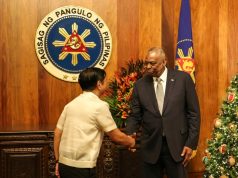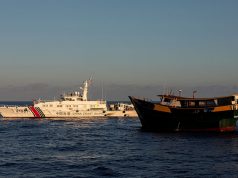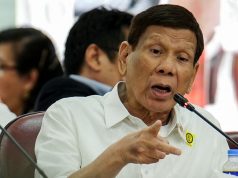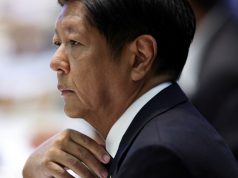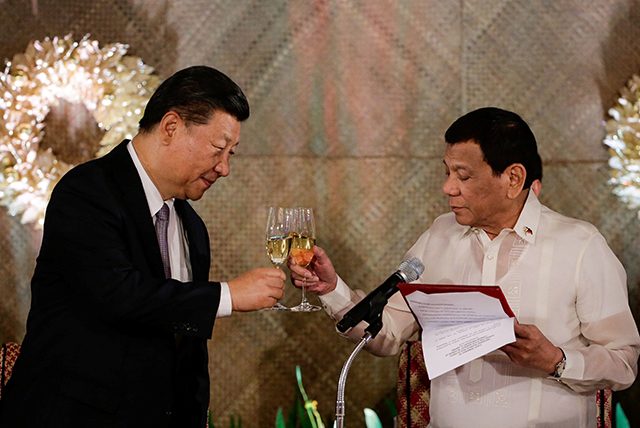
With less than two years left in his term, President Rodrigo Duterte‘s perceived shift in tone toward China was attributed to its lackluster delivery of infrastructure pledges to the Philippines.
During the 75th session of the United Nations General Assembly, Duterte participated for the first time and upheld the Philippines’ 2016 legal victory against China before state leaders, a gesture that surprised his critics given his known friendly relations with the Asian power.
“The Philippines affirms that commitment in the South China Sea in accordance with UNCLOS and the 2016 Arbitral Award. The Award is now part of international law, beyond compromise and beyond the reach of passing governments to dilute, diminish or abandon. We firmly reject attempts to undermine it,” he said.
In the same speech, Duterte also welcomed the support of the international community.
“This, as it should, is the majesty of the law,” he said.
The July 2016 landmark ruling of The Hague-based Permanent Court of Arbitration recognized the Philippines’ sovereignty over its exclusive economic zone in the West Philippine Sea and invalidated China’s sweeping historical nine-dash claim.
Throughout his presidency, Duterte often expressed his reluctance to reinforce or invoke this decision to court China for his administration’s infrastructure projects even at the expense of the lives of Filipino fishermen within these waters.
This sudden move eventually earned the praise of some of his critics, including retired Supreme Court senior associate justice Antonio Carpio.
Unmet expectations
In a Facebook post on September 28, former opposition lawmaker Gary Alejano cited China’s non-delivery of $24 billion investments it pledged to the Philippines as a possible reason for the change in Duterte’s policy toward the economic giant.
“With less than 2 years in his term it seems that the big infra projects are not forthcoming. Out of $24bn pledge of China only less than a billion dollars’ worth of projects have been consummated according to some reports. Mas nakinabang ang China sa ganitong arrangement,” he wrote in a Facebook post.
WHAT WILL CHANGE DIGONG'S MIND ABOUT CHINA?I was once asked by a foreign media on what will change Digong's…
Posted by Gary Alejano on Sunday, September 27, 2020
In 2016, Duterte brought home an estimated $24 billion in investment and loan pledges to fund his ambitious Build, build, build infrastructure program after his bilateral meeting with Chinese President Xi Jinping.
Alejano argued that neighboring countries managed to protect their maritime rights against Chinese incursions and still acquire the needed investments from them.
“Pwede namang makuha ng bansa ang needed investments kahit hindi tayo magpakatuta sa China. Look at Malaysia, Vietnam and Indonesia. They stood their grounds against China’s incursions to their EEZ and yet they get more investments and tourist arrivals from China compared to the Philippines,” he said.
Alejano then stated that China might have already “compromised” the country’s national interest and security.
“Our national interest and security have already been compromised and it has long term implications to our country. Nakapag survey na sila sa mga dagat natin na walang paalam at nandiyan na rin sila sa mga critical infras natin like communications, water, and energy,” he said.
“Great day everyone! Ingat sa COVID (imported from China),” he added.
China reminded Duterte: ‘Close the old chapter and shelve differences’
At a virtual forum last week, Chinese Ambassador to the Philippines Huang Xilian noted that both presidents, Duterte and Xi, have agreed to a consensus to dismiss this arbitral ruling and “close the old chapter and shelve differences.”
“China’s position on the so-called arbitral ruling has been very clear: We do not accept and we do not recognize this so-called ruling. It has been agreed by our two presidents that we should close the old chapter and shelve differences,” said Huang.
Huang also claimed that residents in both countries continued to “enjoy freedom of navigation in South China Sea in accordance with international law” despite the recent aggressions of Chinese vessels to Filipino fishing boats which nearly cost their lives.
Former opposition senator Antonio Trillanes IV, a vocal Duterte critic, said that such response should already be enough to prove Duterte’s hand in neglecting the country’s rights over the West Philippine Sea.
“Maliwanag na siguro sa mga kababayan natin na si Duterte mismo ang nagbenta ng interest ng Pilipinas sa WPS,” Trillanes tweeted.





